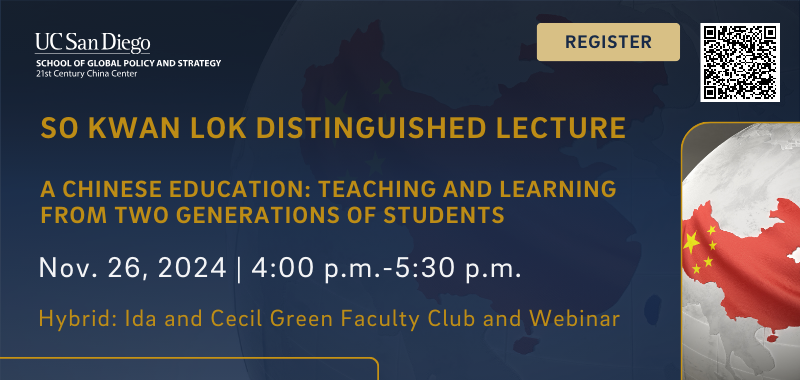Nov 26, 2024–Nov 26, 2024 from 4:00pm–5:30pm
A Chinese Education: Teaching and Learning from Two Generations of Students

In 1996, Peter Hessler was sent as a Peace Corps volunteer to Fuling, a small city on the Yangtze. Almost all of his students had grown up in rural homes, often in poverty, and usually they were the first members of their extended family to enter higher education.
After teaching for two years, Hessler wrote his first book, “River Town,” and he became The New Yorker’s Beijing correspondent. For more than two decades, he stayed in close touch with his former students, observing how they negotiated China’s Reform era. In 2019, Hessler returned to teach again in the same region, at Sichuan University. In the classroom he met members of the next generation of students, almost all of whom had grown up in urban middle-class homes that had been restricted to a single child. While teaching, Hessler also revisited Fuling and the people he had taught in the 1990s, an experience that helped him gain a new perspective on China’s transformation.
A reception will start at 4 p.m. and the lecture will start at 4:30 p.m.
Speaker:
Peter Hessler is a writer of narrative nonfiction and the author of six books. In 1996, he joined the Peace Corps, which sent him to Fuling, a small city in southwestern China. For two years, he taught English and American literature at Fuling Teachers College, an experience that eventually became the subject of his first book, “River Town,” which was published in 2001. This book was followed by two others about China: “Oracle Bones” (2006), and “Country Driving” (2010), all of which became New York Times bestsellers.
Together, these books comprise Hessler’s “China trilogy,” covering the decade in which he lived in the country. During this period, China underwent enormous change, and Hessler recorded the moment through observing average citizens.
For the most part, he avoided writing about the famous and the powerful, instead focusing on farmers, factory workers, students, teachers, traders and small entrepreneurs. Most of his subjects reflected two key social dynamics of this era: the mass migration from the countryside to cities, and the tens of millions of Chinese individuals who were now becoming members of the new middle class.
Since 2000, Hessler has been a staff writer at The New Yorker, and he is also a contributing writer at National Geographic Magazine.
Moderator:
Barry Naughton is one of America’s most highly respected economists working on China. He has written an authoritative textbook, “The Chinese Economy: Transitions and Growth,” and his groundbreaking book “Growing Out of the Plan: Chinese Economic Reform, 1978-1993” received the Ohira Memorial Prize. His latest book, “The Rise of China's Industrial Policy, 1978 to 2020,” details key developments in industrial policy in the post-Mao period. Naughton’s recent research focuses on China’s industrial policy.
-------------------
So Kwan Lok Distinguished Lecture is organized by the 21st Century China Center at the UC San Diego School of Global Policy and Strategy. For more information about this named lecture, please consult the webpage about the So Kwan Lok Lecture.
Date and Time
Nov 26, 2024–Nov 26, 2024
from 4:00pm–5:30pm
Location
Atkinson Pavilion and Patio, Ida and Cecil Green Faculty Club
Event Registration
Registration for this event is required
by .
Visit the registration page for details.
Event Fee
Free
Contact
Susan Zau • jszau@ucsd.edu • 858-82-21698
Audience
Faculty, Staff, Students, The General Public, Alumni, Parents and Family
Event Host
21st Century China Center at School of Global Policy and Strategy